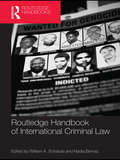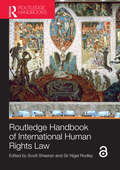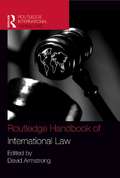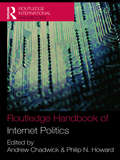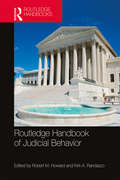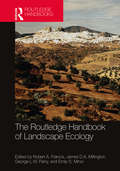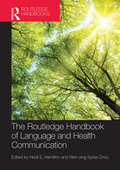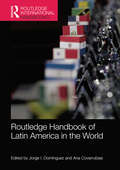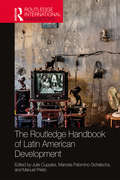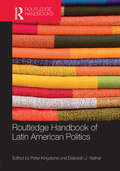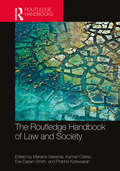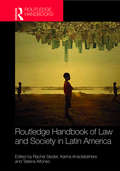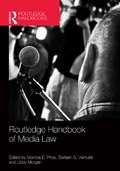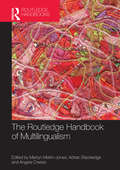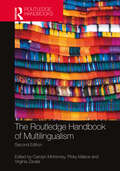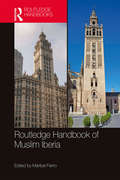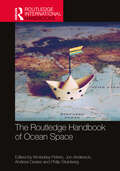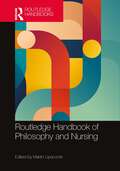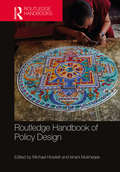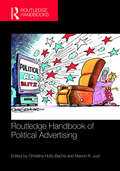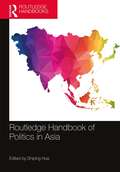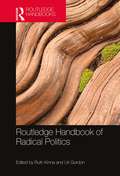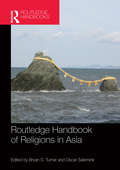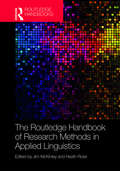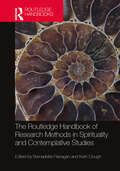- Table View
- List View
Routledge Handbook of International Criminal Law
by William A. SchabasInternational criminal law has developed extraordinarily quickly over the last decade, with the creation of ad hoc tribunals in the former Yugoslavia and Rwanda, and the establishment of a permanent International Criminal Court. This book provides a timely and comprehensive survey of emerging and existing areas of international criminal law. The Handbook features new, specially commissioned papers by a range of international and leading experts in the field. It contains reflections on the theoretical aspects and contemporary debates in international criminal law. The book is split into four parts for ease of reference: The Historical and Institutional Framework – Sets international criminal law firmly in context with individual chapters on the important developments and key institutions which have been established. The Crimes – Identifies and analyses international crimes, including a chapter on aggression. The Practice of International Tribunals – Focuses on topics relating to the practice and procedure of international criminal law. Key Issues in International Criminal Law – Goes on to explore issues of importance such as universal jurisdiction, amnesties and international criminal law and human rights. Providing easy access to up-to-date and authoritative articles covering all key aspects of international criminal law, this book is an essential reference work for students, scholars and practitioners working in the field.
Routledge Handbook of International Human Rights Law
by Scott Sheeran Nigel RodleyThe Routledge Handbook of International Human Rights Law provides the definitive global survey of the discipline of international human rights law. Each chapter is written by a leading expert and provides a contemporary overview of a significant area within the field. As well as covering topics integral to the theory and practice of international human rights law the volume offers a broader perspective though examinations of the ways in which human rights law interacts with other legal regimes and other international institutions, and by addressing the current and future challenges facing human rights. Providing up-to-date and authoritative articles covering key aspects of international human rights law, this book work is an essential work of reference for scholars, practitioners and students alike. Chapter 35 of this book is freely available as a downloadable Open Access PDF under a Creative Commons Attribution-Non Commercial-No Derivatives 3.0 license. https://www.routledgehandbooks.com/doi/10.4324/9780203481417.ch35
Routledge Handbook of International Law (Routledge International Handbooks)
by David ArmstrongThe Routledge Handbook of International Law provides a definitive global survey of the interaction of international politics and international law. Each chapter is written by a leading expert and provides a state of the art overview of the most significant areas within the field. This highly topical collection of specially commissioned papers from both established authorities and rising stars is split into four key sections: The Nature of International Law including the interaction between the disciplines of International Law and International Relations The Evolution of International Law progressing from the ancient world to present day. Law and Power in International Society discussing topical issues such as the war in Iraq and the international criminal court Key Issues in International Law including international refugee law, indigenous rights, intellectual property, trade and the challenges presented by "new terrorism". A comprehensive survey of the state of the discipline, The Routledge Handbook of International Law is an essential work of reference for scholars and practitioners of international Law.
Routledge Handbook of Internet Politics
by Philip N. Howard Andrew ChadwickThe politics of the internet has entered the social science mainstream. From debates about its impact on parties and election campaigns following momentous presidential contests in the United States, to concerns over international security, privacy and surveillance in the post-9/11, post-7/7 environment; from the rise of blogging as a threat to the traditional model of journalism, to controversies at the international level over how and if the internet should be governed by an entity such as the United Nations; from the new repertoires of collective action open to citizens, to the massive programs of public management reform taking place in the name of e-government, internet politics and policy are continually in the headlines. The Routledge Handbook of Internet Politics is a collection of over thirty chapters dealing with the most significant scholarly debates in this rapidly growing field of study. Organized in four broad sections: Institutions, Behavior, Identities, and Law and Policy, the Handbook summarizes and criticizes contemporary debates while pointing out new departures. A comprehensive set of resources, it provides linkages to established theories of media and politics, political communication, governance, deliberative democracy and social movements, all within an interdisciplinary context. The contributors form a strong international cast of established and junior scholars. This is the first publication of its kind in this field; a helpful companion to students and scholars of politics, international relations, communication studies and sociology.
Routledge Handbook of Judicial Behavior
by Robert M. Howard Kirk A. RandazzoInterest in social science and empirical analyses of law, courts and specifically the politics of judges has never been higher or more salient. Consequently, there is a strong need for theoretical work on the research that focuses on courts, judges and the judicial process. The Routledge Handbook of Judicial Behavior provides the most up to date examination of scholarship across the entire spectrum of judicial politics and behavior, written by a combination of currently prominent scholars and the emergent next generation of researchers. Unlike almost all other volumes, this Handbook examines judicial behavior from both an American and Comparative perspective. Part 1 provides a broad overview of the dominant Theoretical and Methodological perspectives used to examine and understand judicial behavior, Part 2 offers an in-depth analysis of the various current scholarly areas examining the U.S. Supreme Court, Part 3 moves from the Supreme Court to examining other U.S. federal and state courts, and Part 4 presents a comprehensive overview of Comparative Judicial Politics and Transnational Courts. Each author in this volume provides perspectives on the most current methodological and substantive approaches in their respective areas, along with suggestions for future research. The chapters contained within will generate additional scholarly and public interest by focusing on topics most salient to the academic, legal and policy communities.
The Routledge Handbook of Landscape Ecology
by Robert A. Francis, James D.A. Millington, George L.W. Perry, and Emily S. MinorThe Handbook provides a supporting guide to key aspects and applications of landscape ecology to underpin its research and teaching. A wide range of contributions written by expert researchers in the field summarize the latest knowledge on landscape ecology theory and concepts, landscape processes, methods and tools, and emerging frontiers. Landscape ecology is an interdisciplinary and holistic discipline, and this is reflected in the chapters contained in this Handbook. Authors from varying disciplinary backgrounds tackle key concepts such as landscape structure and function, scale and connectivity; landscape processes such as disturbance, flows, and fragmentation; methods such as remote sensing and mapping, fieldwork, pattern analysis, modelling, and participation and engagement in landscape planning; and emerging frontiers such as ecosystem services, landscape approaches to biodiversity conservation, and climate change. Each chapter provides a blend of the latest scientific understanding of its focal topics along with considerations and examples of their application from around the world. An invaluable guide to the concepts, methods, and applications of landscape ecology, this book will be an important reference text for a wide range of students and academics in ecology, geography, biology, and interdisciplinary environmental studies.
The Routledge Handbook of Language and Health Communication (Routledge Handbooks in Applied Linguistics)
by Heidi Hamilton Wen-ying Sylvia ChouThe Routledge Handbook of Language and Health Communication consists of forty chapters that provide a broad, comprehensive, and systematic overview of the role that linguistics plays within health communication research and its applications. The Handbook is divided into three sections: Individuals’ everyday health communication Health professionals’ communicative practices Patient-provider communication in interaction Special attention is given to cross-cutting themes, including the role of technology in health communication, narrative, and observations of authentic, naturally-occurring contexts. The chapters are written by international authorities representing a wide range of perspectives and approaches. Building on established work with cutting-edge studies on the changing health communication landscape, this volume will be an essential reference for all those involved in health communication and applied linguistics research and practice.
Routledge Handbook of Latin America in the World
by Jorge I. Domínguez and Ana CovarrubiasThe Handbook of Latin America in the World explains how the Latin American countries have both reacted and contributed to changing international dynamics over the last 30 years. It provides a comprehensive picture of Latin America’s global engagement by looking at specific processes and issues that link governments and other actors, social and economic, within the region and beyond. Leading scholars offer an up-to-date state of the field, theoretically and empirically, thus avoiding a narrow descriptive approach. The Handbook includes a section on theoretical approaches that analyze Latin America’s place in the international political and economic system and its foreign policy making. Other sections focus on the main countries, actors, and issues in Latin America’s international relations. In so doing, the book sheds light on the complexity of the international relations of selected countries, and on their efforts to act multilaterally. The Routledge Handbook of Latin America in the World is a must-have reference for academics, researchers, and students in the fields of Latin American politics, international relations, and area specialists of all regions of the world.
The Routledge Handbook of Latin American Development (Routledge International Handbooks)
by Julie Cupples Marcela Palomino-Schalscha Manuel PrietoThe Routledge Handbook of Latin American Development seeks to engage with comprehensive, contemporary, and critical theoretical debates on Latin American development. The volume draws on contributions from across the humanities and social sciences and, unlike earlier volumes of this kind, explicitly highlights the disruptions to the field being brought by a range of anti-capitalist, decolonial, feminist, and ontological intellectual contributions. The chapters consider in depth the harms and suffering caused by various oppressive forces, as well as the creative and often revolutionary ways in which ordinary Latin Americans resist, fight back, and work to construct development defined broadly as the struggle for a better and more dignified life. The book covers many key themes including development policy and practice; neoliberalism and its aftermath; the role played by social movements in cities and rural areas; the politics of water, oil, and other environmental resources; indigenous and Afro-descendant rights; and the struggles for gender equality. With contributions from authors working in Latin America, the US and Canada, Europe, and New Zealand at a range of universities and other organizations, the handbook is an invaluable resource for students and teachers in development studies, Latin American studies, cultural studies, human geography, anthropology, sociology, political science, and economics, as well as for activists and development practitioners.
Routledge Handbook of Latin American Politics
by Peter Kingstone Deborah J. YasharLatin America has been one of the critical areas in the study of comparative politics. The region’s experiments with installing and deepening democracy and promoting alternative modes of economic development have generated intriguing and enduring empirical puzzles. In turn, Latin America’s challenges continue to spawn original and vital work on central questions in comparative politics: about the origins of democracy; about the relationship between state and society; about the nature of citizenship; about the balance between state and market. The richness and diversity of the study of Latin American politics makes it hard to stay abreast of the developments in the many sub-literatures of the field. The Routledge Handbook of Latin American Politics offers an intellectually rigorous overview of the state of the field and a thoughtful guide to the direction of future scholarship. Kingstone and Yashar bring together the leading figures in the study of Latin America to present extensive empirical coverage, new original research, and a cutting-edge examination of the central areas of inquiry in the region.
The Routledge Handbook of Law and Society
by Mariana Valverde Kamari Clarke Eve Darian-Smith Prabha KotiswaranThis innovative handbook provides a comprehensive, and truly global, overview of the main approaches and themes within law and society scholarship or social-legal studies. A one-volume introduction to academic resources and ideas that are relevant for today’s debates on issues from reproductive justice to climate justice, food security, water conflicts, artificial intelligence, and global financial transactions, this handbook is divided into two sections. The first, ‘Perspectives and Approaches’, accessibly explains a variety of frameworks through which the relationship between law and society is addressed and understood, with emphasis on contemporary perspectives that are relatively new to many socio-legal scholars. Following the book’s overall interest in social justice, the entries in this section of the book show how conceptual tools originate in, and help to illuminate, real-world issues. The second and largest section of the book (42 short well-written pieces) presents reflections on topics or areas concerning law, justice, and society that are inherently interdisciplinary and that are relevance to current – but also classical – struggles around justice. Informing readers about the lineage of ideas that are used or could be used today for research and activism, the book attends to the full range of local, national and transnational issues in law and society. The authors were carefully chosen to achieve a diverse and non-Eurocentric view of socio-legal studies. This volume will be invaluable for law students, those in inter-disciplinary programs such as law and society, justice studies and legal studies, and those with interests in law, but based in other social sciences. It will also appeal to general readers interested in questions of justice and rights, including activists and advocates around the world.
Routledge Handbook of Law and Society in Latin America
by Rachel Sieder Karina Ansolabehere Tatiana A. Alfonso SierraAn understanding of law and its efficacy in Latin America demands concepts distinct from the hegemonic notions of "rule of law" which have dominated debates on law, politics and society, and that recognize the diversity of situations and contexts characterizing the region. The Routledge Handbook of Law and Society in Latin America presents cutting-edge analysis of the central theoretical and applied areas of enquiry in socio-legal studies in the region by leading figures in the study of law and society from Latin America, North America and Europe. Contributors argue that scholarship about Latin America has made vital contributions to longstanding and emerging theoretical and methodological debates on the relationship between law and society. Key topics examined include: The gap between law-on-the-books and law in action The implications of legal pluralism and legal globalization The legacies of experiences of transitional justice Emerging forms of socio-legal and political mobilization Debates concerning the relationship between the legal and the illegal. The Routledge Handbook of Law and Society in Latin America sets out new research agendas for cross-disciplinary socio-legal studies and will be of interest to those studying law, sociology of law, comparative Latin American politics, legal anthropology and development studies.
Routledge Handbook of Media Law
by Monroe E. Price Stefaan Verhulst Libby MorganFeaturing specially commissioned chapters from experts in the field of media and communications law, this book provides an authoritative survey of media law from a comparative perspective. The handbook does not simply offer a synopsis of the state of affairs in media law jurisprudence, rather it provides a better understanding of the forces that generate media rules, norms, and standards against the background of major transformations in the way information is mediated as a result of democratization, economic development, cultural change, globalization and technological innovation. The book addresses a range of issues including: Media Law and Evolving Concepts of Democracy Network neutrality and traffic management Public Service Broadcasting in Europe Interception of Communication and Surveillance in Russia State secrets, leaks and the media A variety of rule-making institutions are considered, including administrative, and judicial entities within and outside government, but also entities such as associations and corporations that generate binding rules. The book assesses the emerging role of supranational economic and political groupings as well as non-Western models, such as China and India, where cultural attitudes toward media freedoms are often very different. Monroe E. Price is Director of the Center for Global Communication Studies at the Annenberg School for the University of Pennsylvania and Joseph and Sadie Danciger Professor of Law and Director of the Howard M. Squadron Program in Law, Media and Society at the Cardozo School of Law. Stefaan Verhulst is Chief of Research at the Markle Foundation. Previously he was the co-founder and co-director, with Professor Monroe Price, of the Programme in Comparative Media Law and Policy (PCMLP) at Oxford University, as well as senior research fellow at the Centre for Socio Legal Studies. Libby Morgan is the Associate Director of the Center for Global Communication Studies at the Annenberg School for the University of Pennsylvania.
The Routledge Handbook of Multilingualism (Routledge Handbooks in Applied Linguistics)
by Edited by Marilyn Martin-Jones Adrian Blackledge Angela CreeseThe Routledge Handbook of Multilingualism provides a comprehensive survey of the field of multilingualism for a global readership, and an overview of the research which situates multilingualism in its social, cultural and political context. The handbook includes an introduction and five sections with thirty two chapters by leading international contributors. The introduction charts the changing landscape of social and ethnographic research on multilingualism (theory, methods and research sites) and it foregrounds key contemporary debates. Chapters are structured around sub-headings such as: early developments, key issues related to theory and method, new research directions. This handbook offers an authoritative guide to shifts over time in thinking about multilingualism as well as providing an overview of the range of contemporary themes, debates and research sites. The Routledge Handbook of Multilingualism is the ideal resource for postgraduate students of multilingualism, as well as those studying education and anthropology.
The Routledge Handbook of Multilingualism (Routledge Handbooks in Applied Linguistics)
by Carolyn McKinney Pinky Makoe Virginia ZavalaThe Routledge Handbook of Multilingualism provides a comprehensive survey of the field of multilingualism for a global readership and an overview of the research which situates multilingualism in its social, cultural and political context. This fully revised edition not only updates several of the original chapters but introduces many new ones that enrich contemporary debates in the burgeoning field of multilingualism. With a decolonial perspective and including leading new and established contributors from different regions of the globe, the handbook offers a critical overview of the interdisciplinary field of multilingualism, providing a range of central themes, key debates and research sites for a global readership. Chapters address the profound epistemological and ontological challenges and shifts produced since the first edition in 2012. The handbook includes an introduction, five parts with 28 chapters and an afterword. The chapters are structured around sub-themes, such as Coloniality and Multilingualism, Concepts and Theories in Multilingualism, and Multilingualism and Education. This ground-breaking text is a crucial resource for researchers, scholars and postgraduate students interested in multilingualism from areas such as sociolinguistics, applied linguistics, anthropology and education.
The Routledge Handbook of Muslim Iberia
by Maribel FierroThis handbook offers an overview of the main issues regarding the political, economic, social, religious, intellectual and artistic history of the Iberian Peninsula during the period of Muslim rule (eighth–fifteenth centuries). A comprehensive list of primary and secondary sources attests the vitality of the academic study of al-Andalus (= Muslim Iberia) and its place in present-day discussions about the past and the present. The contributors are all specialists with diverse backgrounds providing different perspectives and approaches. The volume includes chapters dealing with the destiny of the Muslim population after the Christian conquest and with the posterity of al-Andalus in art, literature and different historiographical traditions. The chapters are organised in the following sections: Political history, concentrating on rulers and armies Social, religious and economic groups Intellectual and cultural developments Legacy and memory of al-Andalus Offering a synthetic and updated academic treatment of the history and society of Muslim Iberia, this comprehensive and up-to-date collection provides an authoritative and interdisciplinary guide. It is a valuable resource for both specialists and the general public interested in the history of the Iberian Peninsula, Islamic and Medieval studies.
The Routledge Handbook of Ocean Space (Routledge International Handbooks)
by Kimberley PetersInvisible as the seas and oceans may be for so many of us, life as we know it is almost always connected to, and constituted by, activities and occurrences that take place in, on and under our oceans. The Routledge Handbook of Ocean Space provides a first port of call for scholars engaging in the ‘oceanic turn’ in the social sciences, offering a comprehensive summary of existing trends in making sense of our water worlds, alongside new, agenda-setting insights into the relationships between society and the ‘seas around us’. Accordingly, this ambitious text not only attends to a growing interest in our oceans, past and present; it is also situated in a broader spatial turn across the social sciences that seeks to account for how space and place are imbricated in socio-cultural and political life. Through six clearly structured and wide-ranging sections, The Routledge Handbook of Ocean Space examines and interrogates how the oceans are environmental, historical, social, cultural, political, legal and economic spaces, and also zones where national and international security comes into question. With a foreword and introduction authored by some of the leading scholars researching and writing about ocean spaces, alongside 31 further, carefully crafted chapters from established as well as early career academics, this book provides both an accessible guide to the subject and a cutting-edge collection of critical ideas and questions shaping the social sciences today. This handbook brings together the key debates defining the ‘field’ in one volume, appealing to a wide, cross-disciplinary social science and humanities audience. Moreover, drawing on a range of international examples, from a global collective of authors, this book promises to be the benchmark publication for those interested in ocean spaces, past and present. Indeed, as the seas and oceans continue to capture world-wide attention, and the social sciences continue their seaward ‘turn’, The Routledge Handbook of Ocean Space will provide an invaluable resource that reveals how our world is a water world.
Routledge Handbook of Philosophy and Nursing
by Martin LipscombPhilosophy offers a means of unpacking and grappling with important questions and issues relevant to nursing practice, research, scholarship, and education. By engaging in these discussions, this Handbook provides a gateway to new understandings of nursing. The Handbook, which is split loosely into seven sections, begins with a foundational chapter exploring philosophy’s relationship to and with nursing and nursing theory. Subsequent sections thereafter examine a wide range of philosophic issues relevant to nursing knowledge and activity. Philosophy and nursing, philosophy and science, nursing theory. Nursing’s ethical dimension is described. Philosophic questions concerning patient care are investigated. Socio-contextual and political concerns relevant to nursing are unpacked. Contributors tackle difficult questions confronting nursing. Difficulties around speech, courage, and race/otherness are discussed. Philosophic questions pertaining to scholarship, research, and technology are addressed. International in scope, this volume provides a vital reference for all those interested in thinking about nursing, whether students, practitioners, researchers, or educators.
Routledge Handbook of Policy Design
by Michael Howlett Ishani MukherjeeUniting theoretical bases and advancements in practice, the Routledge Handbook of Policy Design brings together leading experts in the academic field of policy design in a pioneering effort of scholarship. Each chapter provides a multi-topic overview of the state of knowledge on how, why, where or when policies are designed and how such designs can be improved. These experts address how a new emphasis on effective policy design has re-emerged in public policy studies in recent years and clarify the role of historical policy decisions, policy capacities and government intentions in promoting a design orientation towards policy formulation and policy-making more generally. They examine many previously unexplored aspects of policy designs and designing activities, which focus upon analyzing and improving the sets of policy tools adopted by governments to correct policy problems. Ranging from the fundamentals of policy design and its place in greater policy studies, to new questions regarding policy design content and effectiveness, to contemporary design trends such as the use of digital tools and big data, the Routledge Handbook of Policy Design is a comprehensive reference for students and scholars of public policy, public administration and public management, government and business.
Routledge Handbook of Political Advertising (Routledge International Handbooks)
by Christina Holtz-Bacha Marion R. JustThis Handbook provides the most comprehensive overview of the role of electoral advertising on television and new forms of advertising in countries from all parts of the world currently available. Thematic chapters address advertising effects, negative ads, the perspective of practitioners and gender role. Country chapters summarize research on issues including political and electoral systems; history of ads; the content of ads; reception and effects of ads; regulation of political advertising on television and the Internet; financing political advertising; and prospects for the future. The Handbook confirms that candidates spend the major part of their campaign budget on television advertising. The US enjoys a special situation with almost no restrictions on electoral advertising whereas other countries have regulation for the time, amount and sometimes even the content of electoral advertising or they do not allow television advertising at all. The role that television advertising plays in elections is dependent on the political, the electoral and the media context and can generally be regarded as a reflection of the political culture of a country. The Internet is relatively unregulated and is the channel of the future for political advertising in many countries
Routledge Handbook of Politics in Asia
by Shiping HuaThe Routledge Handbook of Politics in Asia is designed to serve as a comprehensive reference guide to politics in Asia. Covering East, South, Southeast, and Central Asia, this handbook brings together the work of leading international academics to cover the political histories, institutions, economies, and cultures of the region. Taking a comparative approach, it is divided into four parts, including: A thorough introduction to the politics of the four regions of Asia from the perspectives of democratization, foreign policy, political economy, and political culture. An examination of the "Big Three" of Asia – China, India, and Japan – focusing on issues including post-Mao reform, China’s new world outlook, Indian democracy, and Japanese foreign policy. A discussion of important contemporary issues, such as human rights, the politics of the internet, security, nationalism, and geopolitics. An analysis of the relationship between politics and certain theoretical ideas, such as Confucianism, Hinduism, socialist constitutionalism, and gender norms. As an invaluable and all-inclusive resource, this handbook will be useful for students, scholars, researchers, and practitioners of Asian politics and comparative politics.
Routledge Handbook of Radical Politics
by Ruth Kinna Uri GordonSuccessive waves of global protest since 1999 have encouraged leading contemporary political theorists to argue that politics has fundamentally changed in the last twenty years, with a new type of politics gaining momentum over elite, representative institutions. The new politics is frequently described as radical, but what does radicalism mean for the conduct of politics? Capturing the innovative practices of contemporary radicals, Routledge Handbook of Radical Politics brings together leading academics and campaigners to answer these questions and explore radicalism’s meaning to their practice. In the thirty-five chapters written for this collection, they collectively develop a picture of radicalism by investigating the intersections of activism and contemporary political theory. Across their experiences, the authors articulate radicalism’s critical politics and discuss how diverse movements support and sustain each other. Together, they provide a wide-ranging account of the tensions, overlaps and promise of radical politics, while utilising scholarly literatures on grassroots populism to present a novel analysis of the relationship between radicalism and populism. Routledge Handbook of Radical Politics serves as a key reference for students and scholars interested in the politics and ideas of contemporary activist movements.
Routledge Handbook of Religions in Asia
by Bryan S. Turner and Oscar SaleminkThe Routledge Handbook of Religions in Asia provides a contemporary and comprehensive overview of religion in contemporary Asia. Compiled and introduced by Bryan S. Turner and Oscar Salemink, the Handbook contains specially written chapters by experts in their respective fields. The wide-ranging introduction discusses issues surrounding Orientalism and the historical development of the discipline of Religious Studies. It conveys how there have been many centuries of interaction between different religious traditions in Asia and discusses the problem of world religions and the range of concepts, such as high and low traditions, folk and formal religions, popular and orthodox developments. Individual chapters are presented in the following five sections: Asian Origins: religious formations Missions, States and Religious Competition Reform Movements and Modernity Popular Religions Religion and Globalization: social dimensions Striking a balance between offering basic information about religious cultures in Asia and addressing the complexity of employing a western terminology in societies with radically different traditions, this advanced level reference work will be essential reading for students, researchers and scholars of Asian Religions, Sociology, Anthropology, Asian Studies and Religious Studies.
The Routledge Handbook of Research Methods in Applied Linguistics (Routledge Handbooks in Applied Linguistics)
by Jim McKinley Heath RoseThe Routledge Handbook of Research Methods in Applied Linguistics provides a critical survey of the methodological concepts, designs, instruments and types of analysis that are used within the broad field of applied linguistics. With more than 40 chapters written by leading and emerging scholars, this book problematizes and theorizes applied linguistics research, incorporating numerous multifaceted methodological considerations and pointing to the future of good practice in research. Topics covered include: key concepts and constructs in research methodology, such as sampling strategies and mixed methods research; research designs such as experimental research, case study research, and action research; data collection methods, from questionnaires and interviews to think-aloud protocols and data elicitation tasks; data analysis methods, such as use of R, inferential statistical analysis, and qualitative content analysis; current considerations in applied linguistics research, such as a need for transparency and greater incorporation of multilingualism in research; and recent innovations in research methods related to multimodality, eye-tracking, and advances in quantitative methods. The Routledge Handbook of Research Methods in Applied Linguistics is key reading for both experienced and novice researchers in Applied Linguistics as well as anyone undertaking study in this area.
The Routledge Handbook of Research Methods in Spirituality and Contemplative Studies (Routledge Handbooks in Religion)
by Bernadette Flanagan and Kerri CloughThe Routledge Handbook of Research Methods in Spirituality and Contemplative Studies provides the first authoritative overview of methodology in this growing field. Against the background of the pandemic and other global challenges, spirituality is expanding as an agreed term with which to discuss the efforts people make to be fully present to deeper, invisible dimensions of their personal identity and external reality, but until now there have been few resources exploring the different methodological approaches researchers take.This book explores the primary methodologies emerging: First Person, Second Person, and Third Person, and provides a systematisation of spirituality research in applied contexts for the first time. Comprising 33 chapters by a team of international contributors, the book is divided into seven parts: Foundations Approaches to Contemplative Research Contemplative Research in Education Contemplative Research in Work and Leadership Contemplative Research in Science, Health, and Healing Contemplative Research in Social Sciences Contemplative Research and the Way Forward The Handbook provides readers, practitioners, and policymakers with methods and approaches which can facilitate a spiritual and contemplative stance in research activities. It is an essential resource for researchers and students of Religion, Spirituality, and Research Methods.
